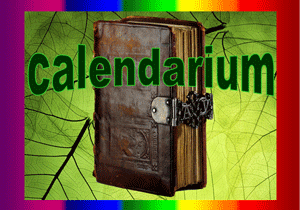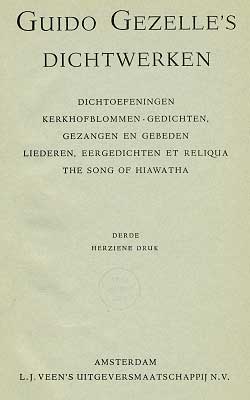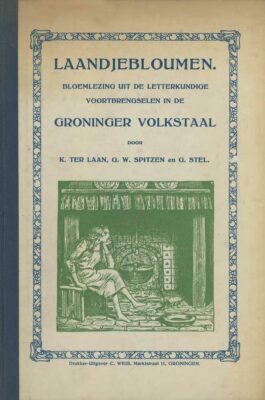Mensis October, wijnmaand, zaaimaand, rozenkransmaand
Machteld Roede
calendarium 1, calendarium 2, calendarium 3 en calendarium 4 — januari 1, januari 2 en januari 3 — februari 1, februari 2 en februari 3 — maart 1, maart 2 en maart 3 — april 1, april 2 en april 3 — mei 1, mei 2 en mei 3 — juni 1, juni 2 en juni 3 — juli 1, juli 2 en juli 3 — augustus 1, augustus 2 en augustus 3 — september 1, september 2, september 3 en september 4 — oktober 1, oktober 2, oktober 3 en oktober 4 — november 1, november 2, november 3 en november 4 — december 1, december 2, december 3 en december 4
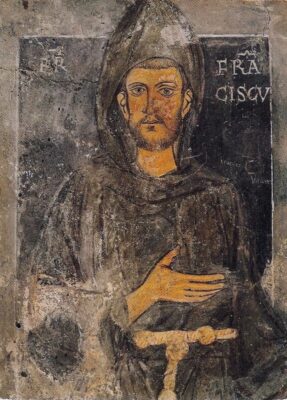
Versie 19 november 2022, herzien oktober 2024
Oktober gedichten
Cantico del Frate Sole |
Het Zonnelied |
|
Altissimu onnipotente bon signore, |
Allerhoogste, almachtige, goede Heer, |
Franciscus van Assisi (?–1226) |
Vertaling[2] |
Bache Bene Venies (11-13e eeuw) |
Bacchus, you are welcome |
|
Bacche, bene venies gratus et optatus, per quem noster animus fit letificatus. Istud vinum, bonum vinum, vinum generosum, reddit virum curialem, probum, animosum. Bacchus forte superans pectora virorum in amorem concitat animos eorum. Bacchus sepe visitans mulierum genus facit eas subditas tibi, o tu Venus. Bacchus venas penetrans calido liquore facit eas igneas Veneris ardore. Bacchus lenis leniens curas et dolores confert iocum, gaudia, risus et amores. Bacchus mentem femine solet hic lenire cogit eam citius viro consentire. Bacchus illam facile solet expugnare, a qua prorsus coitum nequit impetrare. Bacchus numen faciens hominem iocundum, reddit eum pariter doctum et facundum. Bacche, deus inclite, omnes hic astantes leti sumus munera tua prelibantes. Omnes tibi canimus maxima preconia, te laudantes merito tempora per omnia. |
Bacchus, you are welcome, pleasing and desired, through whom our spirits are made joyful. Refrain: This wine, good wine, noble wine, makes a man courtly, fine and spirited. This hollow cup overflows with good wine; of anyone drinks often he will be sated and drunk. These are the royal vessels for which was saked Jerusalem and regal Babylon made rich Bacchus perhaps conquering the hearts of men stirs to love their spirits. Bacchus, often visiting the race of women, makes them subject to you, oh you, Venus. Bacchus, entering their veins with hot liquor sets them afire with the heat of Venus. Gentle Bacchus soothes cares and sorrows brings jolly, joys, laugher and love. We all sing to you the highest praises lauding you deservedly through all ages. |
The Latin original by Carl Orff is straight from the Carmina Burana text, song number 200 |
This translation refers to the sung version in the video[3] |
Trionfo di Bacco e Arianna
|
Bacchus’ Song |
|
Quant’è bella giovinezza, Quest’è Bacco e Arïanna, Questi lieti satiretti, Queste ninfe anche hanno caro Questa soma, che vien drieto Mida vien drieto a costoro: Ciascun apra ben gli orecchi, Donne e giovinetti amanti, |
Youth is so beautiful, This is Bacchus and this is Ariadne, These jolly little satyrs, These nymphs love This clumsy person coming behind them, Midas is coming behind them: Everyone opens his ears, Women and young lovers, |
Lorenzo de’ Medici (1490) |
Translation[4] |

In 1609 verscheen de prachtige bundel Shakespeare’s Sonnets met 154 gedichten, de meeste in sonnetvorm.
Sonnet 73
That time of year thou mayst in me behold
That time of year thou mayst in me behold
When yellow leaves, or none, or few, do hang
Upon those boughs which shake against the cold,
Bare ruin’d choirs, where late the sweet birds sang.
In me thou see’st the twilight of such day
As after sunset fadeth in the West,
Which by and by black night doth take away,
Death’s second self, that seals up all in rest.
In me thou see’st the glowing of such fire
That on the ashes of his youth doth lie,
As the death-bed whereon it must expire,
Consum’d with that which it was nourish’d by.
This thou perceiv’st, which makes thy love more strong,
To love that well which thou must leave ere long.
William Shakespeare (1564–1616)
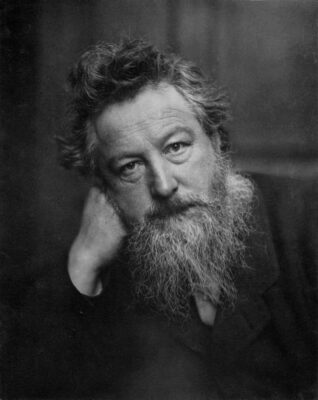
October
O love, turn from the changing sea and gaze,
Down these grey slopes, upon the year grown old,
A-dying ‘mid the autumn-scented haze
That hangeth o’er the hollow in the wold,
Where the wind-bitten ancient elms infold
Grey church, long barn, orchard, and red-roofed stead,
Wrought in dead days for men a long while dead.
Come down, O love; may not our hands still meet,
Since still we live today, forgetting June,
Forgetting May, deeming October sweet? —
— Oh, hearken! hearken! through the afternoon
The grey tower sings a strange old tinkling tune!
Sweet, sweet, and sad, the toiling year’s last breath,
To satiate of life, to strive with death.
And we too — will it not be soft and kind,
That rest from life, from patience, and from pain,
That rest from bliss we know not when we find,
That rest from love which ne’er the end can gain?
— Hark! how the tune swells, that erewhile did wane!
Look up, love! — Ah! cling close, and never move!
How can I have enough of life and love?
William Morris (1834-1896)
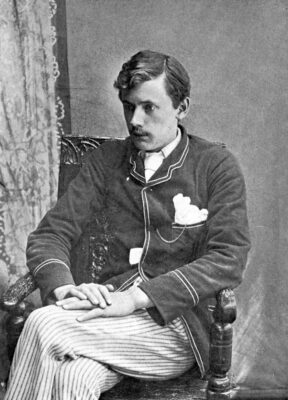
Autumnal
Pale amber sunlight falls across
The reddening October trees,
That hardly sway before a breeze
As soft as summer: summer’s loss
Seems little, dear! on days like these.
Let misty autumn be our part!
The twilight of the year is sweet:
Where shadow and the darkness meet
Our love, a twilight of the heart
Eludes a little time’s deceit.
Are we not better and at home
In dreamful Autumn, we who deem
No harvest joy is worth a dream?
A little while and night shall come,
A little while, then, let us dream.
Beyond the pearled horizons lie
Winter and night: awaiting these
We garner this poor hour of ease,
Until love turn from us and die
Beneath the drear November trees.
Ernest Dawson (1867–1900)
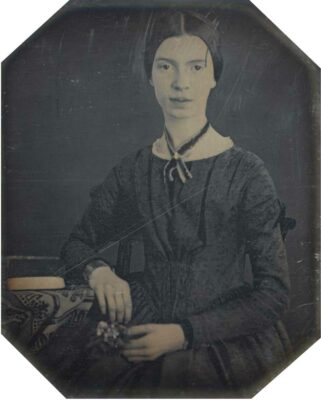
Autumn
The morns are meeker than they were,
The nuts are getting brown;
The berry’s cheek is plumper,
The rose is out of town.
The maple wears a gayer scarf,
The field a scarlet gown.
Lest I should be old-fashioned,
I’ll put a trinket on.
Emily Dickinson (1830-1886)
o Pereboom, belaên
o Pereboom, belaên
met al goudgeelwe blaên,
octoberziek en treurig,
de winter is ‘t, die naast,
en ‘t al het land uit blaast
dat groeizaam is en geurig!
Nog onlangs stondt gij daar,
o schoone perelaar,
één’ witte wolke blommen,
die ‘t weerd was om te zien,
en die naar u de bien
van verre en na deed kommen.
De zomer ging voorbij,
en dan bekroondet gij
uw edel hoofd met bruine,
zoetvleeschde peren, van
daar schier mijn hand aan kan
tot in uw’ hoogste kruine.
Nu staat gij daar en treurt,
ontkinderd en ontkleurd,
en schijnt alom te vragen:
zal niemand, die mij zag
in mijnen schoonen dag,
me een meêlijend herte dragen?
o Pereboom, vaart wel;
‘n wilt voor winter fel
noch weemoed buigen neder:
de winter komt en gaat,
o pereboom: weêrstaat,
verrijzen zult gij weder!
Guido Gezelle (1830–1899), 1890 [8a]
Indian summer
These are the days when Birds come back —
A very few — a Bird or two —
To take a backward look.
These are the days when skies resume
The old — old sophistries of June —
A blue and gold mistake.
Oh fraud that cannot cheat the Bee —
Almost thy plausibility
Induces my belief.
Till ranks of seeds their witness bear —
And softly thro’ the altered air
Hurries a timid leaf.
Oh Sacrament of summer days,
Oh Last Communion in the Haze —
Permit a child to join.
Thy sacred emblems to partake —
They consecrated bread to take
And thine immortal wine!
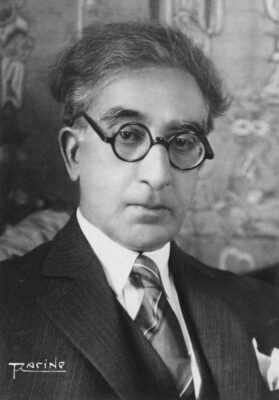
The Retinue of Dionysos
Damon the craftsman (none better
in the Peloponnese) is giving the last touches
to his Retinue of Dionysos
carved in Parian marble: the god leading
in divine glory, with power in his stride;
after him, Intemperance; and beside Intemperance,
Intoxication pours out the satyrs’ wine
from an amphora wreathed in ivy;
near them, Sweetwine, the delicate,
eyes half-closed, soporific;
and behind come the singers
Tunemaker and Melody and Reveller —
the last holding the honored processional torch
which he never lets die — and then Ceremony, so modest.
Damon carves all these. And as he works
his thoughts turn now and then
to the fee he’s going to receive
from the king of Syracuse:
three talents, a large sum.
Adding this to what he has already,
he’ll live grandly from now on, like a rich man,
and—think of it—he’ll be able to go into politics:
he too in the Senate, he too in the Agora.
Konstantinós Kaváfis (1863-1933)[10]
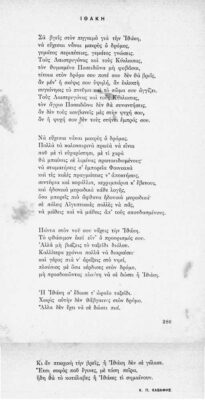
Ιθακη
Σα βγεις στον πηγαιμό για την Ιθάκη,
να εύχεσαι νάναι μακρύς ο δρόμος,
γεμάτος περιπέτειες, γεμάτος γνώσεις.
Τους Λαιστρυγόνας και τους Κύκλωπας,
τον θυμωμένο Ποσειδώνα μη φοβάσαι,
τέτοια στον δρόμο σου ποτέ σου δεν θα βρείς,
αν μέν’ η σκέψις σου υψηλή, αν εκλεκτή
συγκίνησις το πνεύμα και το σώμα σου αγγίζει.
Τους Λαιστρυγόνας και τους Κύκλωπας,
τον άγριο Ποσειδώνα δεν θα συναντήσεις,
αν δεν τους κουβανείς μες στην ψυχή σου,
αν η ψυχή σου δεν τους στήνει εμπρός σου.
Να εύχεσαι νάναι μακρύς ο δρόμος.
Πολλά τα καλοκαιρινά πρωϊά να είναι
που με τι ευχαρίστησι, με τι χαρά
θα μπαίνεις σε λιμένας πρωτοειδωμένους·
να σταματήσεις σ’ εμπορεία Φοινικικά,
και τες καλές πραγμάτειες ν’ αποκτήσεις,
σεντέφια και κοράλλια, κεχριμπάρια κ’ έβενους,
και ηδονικά μυρωδικά κάθε λογής,
όσο μπορείς πιο άφθονα ηδονικά μυρωδικά·
σε πόλεις Αιγυπτιακές πολλές να πας,
να μάθεις και να μάθεις απ’ τους σπουδασμένους.
Πάντα στον νου σου νάχεις την Ιθάκη.
Το φθάσιμον εκεί είν’ ο προορισμός σου.
Αλλά μη βιάζεις το ταξίδι διόλου.
Καλλίτερα χρόνια πολλά να διαρκέσει·
και γέρος πια ν’ αράξεις στο νησί,
πλούσιος με όσα κέρδισες στον δρόμο,
μη προσδοκώντας πλούτη να σε δώσει η Ιθάκη.
Η Ιθάκη σ’ έδωσε το ωραίο ταξίδι.
Χωρίς αυτήν δεν θάβγαινες στον δρόμο.
Αλλο δεν έχει να σε δώσει πια.
Κι αν πτωχική την βρεις, η Ιθάκη δεν σε γέλασε.
Ετσι σοφός που έγινες, με τόση πείρα,
ήδη θα το κατάλαβες οι Ιθάκες τι σημαίνουν.
Κ.Π. Καβαφησ
Ithaka
Als je de tocht aanvaardt naar Ithaka
wens dat de weg dan lang mag zijn,
vol avonturen, vol ervaringen.
De Kyklopen en de Laistrygonen,
de woedende Poseidon behoef je niet te vrezen,
hen zul je niet ontmoeten op je weg
wanneer je denken hoog blijft, en verfijnd
de emotie die je hart en lijf beroert.
De Kyklopen en de Laistrygonen,
de woedende Poseidon zul je niet treffen
wanneer je ze niet in eigen geest meedraagt,
wanneer je geest hun niet gestalte voor je geeft.
Wens dat de weg dan lang mag zijn.
Dat er veel zomermorgens zullen komen
waarop je, met grote vreugde en genot
zult binnenvaren in onbekende havens,
pleisteren in Phoenicische handelssteden
om daar aantrekkelijke dingen aan te schaffen
van parelmoer, koraal, barnsteen en ebbehout,
ook opwindende geurstoffen van alle soorten,
opwindende geurstoffen zoveel je krijgen kunt;
dat je talrijke steden in Egypte aan zult doen
om veel, heel veel te leren van de wijzen.
Houd Ithaka wel altijd in gedachten.
Daar aan te komen is je doel.
Maar overhaast je reis in geen geval.
‘t Is beter dat die vele jaren duurt,
zodat je als oude man pas bij het eiland
het anker uitwerpt, rijk aan wat je onderweg verwierf,
zonder te hopen dat Ithaka je rijkdom schenken zal.
Ithaka gaf je de mooie reis.
Was het er niet, dan was je nooit vertrokken,
verder heeft het je niets te bieden meer.
En vind je het er wat pover, Ithaka bedroog je niet.
Zo wijs geworden, met zoveel ervaring, zul je al
begrepen hebben wat Ithaka’s beduiden.
Konstantinós Kaváfis (1911)[12]
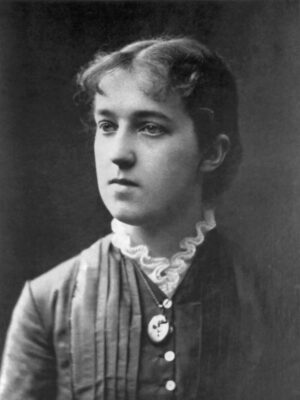
Oktobervijver
Zijn ‘t waterleeljen door de wind bewogen?
Zijn ‘t blanke bloemen van magnolia?
Of pluimen wit, de vleugelen ontvlogen
Van vlottende engle’ in blauwe hemelwâ?
Zijn ‘t vlokken sneeuw uit puur-azuren hoogen
Oktoberhemel, kondende ongenâ
Van wufte koning Herfst en wordt nu logen
‘t Beloofde heil, dat leek mijn hoop zó na?
Op ‘t weekgeplooide groenfluweelen water
Zwemt zoetjes áan een sneeuwblanke eendengroep
En ploegt een lange zilvervoor. — Eén laat er
Plots vleugelkleppend los de blanke troep
En drijft alleen. — En ‘k ril van ‘t schril gesnater,
De stilt’ doortrillende als een weeëroep.
Hélène Swarth (1859-1941)[14]
Herfst
Nu rijpt de herfst de rijkgebronsde peren;
De sappige applen glansen, rood en goud,
En prachtig prijkt, gelijk een tooverwoud,
Het bosch, dat groen in purper doet verkeeren.
Krachtige balsemgeur uit kreupelhout
Van eiken stroomt mij tegen, zilvren veêren
Doorstrepen ‘t reine luchtblauw en vermeeren
Tot éen wolk, die de zon gevangen houdt.
Nu vul die vaas met gele October-rozen,
Leg blauwe druiven op die blanke schaal,
Tusschen de trossen laat de perzik blozen
Als avondrood, en loof als bloedkoraal
Van wilden wingerd blij mijn blik verpoozen,
Die symphonieën zoekt in kleurentaal.
Hélène Swarth[15]
In October
Nu vallen alle blaadren af, de herfst is overal,
Maar in mijn ziel bloeit zomerloof, dat nooit verwelken zal.
Ik voel mij veilig aan uw borst, uw arm is om mij heen
Kus zacht mijn warme tranen weg: zij zijn voor u alleen.
De vogels vlieden ver van hier, bij bloem- en bladerval,
Maar in mijn ziel klinkt liefdezang, die nooit verstommen zal
Droef zingt de wilde najaarswind een winterprophetie.
Als ik uw stem maar hooren mag, als ‘k maar uwe oogen zie!
Het dorre loover dwarrelt neer en hecht zich aan mijn haar,
En ‘t wordt mij bang, of dit nu ‘t eind’ van onze liefde waar.
O klem mij vaster aan uw hart! vraag niet waarom ik ween,
Maar kus mijn warme tranen weg: zij zijn voor u alleen.
Hélène Swarth[16]
October
Nou met een voart de voale doagen duustren
En dumt de greide sunner sieroad leit; —
De bonte bladjes, stram en trillend, fluustern
Van leven, dat noar ‘Stille Riek toe geit; —
Nou komt de sun met sachte vingers snuustern’
Ien alles wat nog deur heur warmte steit;
De bomen stoan, van gold deurlicht, te luustern,
Hoe t’eigen blad beneden rikt op ‘t reit.
’t Komt ál ten rust. De leste vogels trekken;
Heur swarte vlucht wiet suzend op en del; —
Een kraai ropt al de winter, schar en schel.
En woar de sunnestroalen niet meer rekke, —
Ien schaar de bloaden doalen, stil as snel, —
Dwoalt blauwe damp as miemerij veurbij.
J. Dijkstra (1879- …; p. 221)[17]
Harfst
‘t Is harfst! Sums wel zoo kold en nat,
De bakken bin vol woater.
De kool en boonen bin’n in ‘t vat,
Men zörgt al weêr veur laoter.
‘t Is harfst: de blaoren vall’n weer
Bie bosjes van de boom’n,
De kachels mouten d’r weer heer:
De winter zel ja kom’n.
Het land wordt straks weer leēg en kaol,
Veul vruchten het ‘t ons gev’n,
De bloumen worden slap en vaol,
Naotuur legt aof heur lev’n,
‘t Is harfst! den komt gewis dei tied
Bie ‘t klimmen van de jaoren.
En is ‘r din soms muite en stried,
De moud nait laoten vaor’n.
En naodert ‘s levens wintertied,
Sums zunder zorg en vreez’n,
Din kin men, jao zoo gansch verblied,
Tevreē en dankbaor wez’n.
Ik wins joe lezers, jong of old,
Dat zoo joen lot mag wez’n,
As God dat over ons bepaolt,
Din is d’r niks te vreez’n.
D.F. Ferré Jacobs (1835- …, p. 44)[17]
Noten
[1] Bron: Franciscus van Assisi — bovenste deel van het oudste portret van Franciscus van Assisi, een fresco van de Sacro Speco in Subiaco
[2] G.P. Freeman en anderen, Franciscus van Assisi — De Geschriften. Haarlem: Gottmer, 2006 (2e druk)
[3] Zie: https://lyricstranslate.com/nl/bache-bene-venies-carmina-burana-200-bacchus-you-are-welcome.html geraadpleegd op 27 oktober 2022
[4] Vertaling: lyricstranslate.com/nl/canzona-di-bacco-bacchus’-song.html geraadpleegd op 27 oktober 2022
[5] Bron: William Shakespeare (1610) — toegeschreven aan John Taylor, National Portrait Gallery (London).
[6] Bron: William Morris (1887) — foto Frederick Hollyer. In: J. W. Mackail (1899) The Life of William Morris in two volumes, London, New York and Bombay: Longmans, Green and Co.
[7] Bron: Ernest Dowson. In: The Poems of Ernest Dowson (1905) London: John Lane.
[8] In: Emily Dickinson (1890; 1982) Collected Poems of Emily Dickinson. New York-Avenel: Gramery Books.
[8a] In: Guido Gezelle’s Dichtwerken deel 1 en 2 (1949-1950). Amsterdam: LJ Veens uitgeversmaatschappij NV
[9] Bron: Konstantinós Kaváfis (in 1929) — fotograaf onbekend
[10] Cavavy, C.P. (1975, 1978) Collected Poems. Translated by Edmund Keeley & Philip Sherrard; London: Chatto & Windus.
[11] Bron: Ιθάκη — Konstantinós Kaváfis (1863–1933), Grammata magazine vol 9-10, 1911
[12] Vertaald uit het Grieks: Hans Warren en Mario Molengraaf, Gedichten, Amsterdam 1991 (Nog een vijftal andere Nederlandse dichters kwamen met een vertaling, waaronder C. Buddingh).
[13] Bron: Hélène Swarth (1879) — foto Géruzet Frères.
[14] In: De Gids, jaargang 68 (1904).
[15] In: Hélène Swarth (1918) Verzen, derde deeltje. Amsterdam: L.J. Veen.
[16] In: Hélène Swarth (1930) Natuurpoëzie. Geraadpleegd op 2022-10-04 dbnl.org/tekst/swar008natu01_01
[17] In: Ter Laan, K., G.W. Spitzen en G. Stel (1923, 1e druk) Laandjebloumen, bloemlezing uit de letterkundige voortbrengelen in de Groninger Volkstaal. p. 44. Groningen: Drukkerij-Uitgeverij C. Weis. Met ‘Veuraof door Geert Teis Pzn.’, pseudoniem van G.W. Spitzen (1864-1945), een schrijver in het Gronings. Hij is bekend door o.a. het Gronings volkslied ‘Van Lauwerszee tot Dollard tou’ en de ‘Knoalster Lorelei’ — ook in deze bundel — dat begint met ‘Ik wait nait, wat zel ‘t toch beduden, dat ik zo miesderig bin’. In deze bundel staat tevens een (levens)herfst gedicht van een redacteur van de Appingedamster Courant, D.F. Ferré Jacobs. Geraadpleegd op 2022-11-11 dbnl.org/arch/laan005laan01_01/pag/laan005laan01_01.pdf

